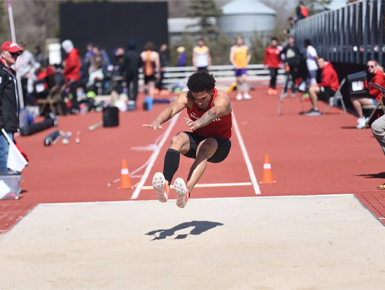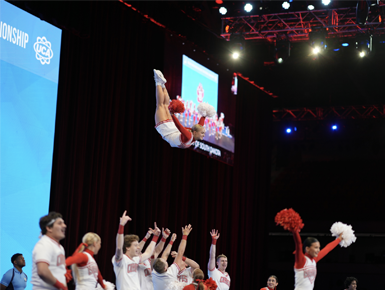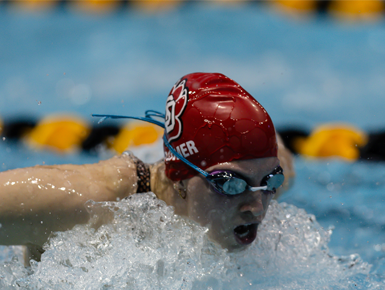From Practice to Practicum: USD School of Education Students Balance Teaching and Athletics

Jayden Green, from Chicago, Illinois, is a physical education and health education major, a middle and high school PE student-teacher at Vermillion Middle School and Vermillion High School, as well as a Track & Field, long and triple jump, athlete.
Elizabeth Boysen, from Sioux Falls, South Dakota, is a secondary history education major, a sixth-grade social studies student-teacher at Vermillion Middle School, and Spirit Squad athlete.
Christina Spomer, from Omaha, Nebraska, is an elementary and special education double major, a special education student-teacher at Vermillion High School, and a Swimming & Diving athlete.
Whether competing in the Dakota Dome, powering through a lap in a swim meet, setting a personal record on the track or cheering from the sidelines, these candidates channel their passion and perseverance in both sports and teaching. Their residency journeys are shaped not just by competition, but by the resilience and leadership they built along the way, preparing them for impactful careers in education.
Through their residency experience, they develop critical strengths like time management, problem-solving, adaptability and leadership — all of which prepare them for success in the classroom and beyond.
We sat down with Green, Boysen and Spomer to gain insight into their academic and athletic experiences.
Why did you choose USD for both academics and athletics?
Jayden: I decided on USD because it’s a D1 school in a smaller town. I knew that I would be focused and stay on task. The Track & Field team is also in the top 30 programs in the nation.
Elizabeth: I have a lot of family who went to USD, and I have always been a Coyote fan. I always knew I would go to USD and, as a bonus, I have been lucky enough to be part of the USD Spirit Squad.
Christina: I connected with my academic advisor, Nicki Carr, during my visit and heard a lot of great things about the education program. I liked that it was a double major for special education and elementary education, instead of a major and minor. I also loved the athletic coaches, the support and facilities, as well as the individualized training schedule. It’s also nice that it’s close enough to home but far enough away.
What inspired you to pursue a career in teaching and how did being an athlete influence this decision?
Jayden: When I was growing up, I didn’t have access to the best education system or anyone to go to in a lot of circumstances. When I was in seventh grade, my track and field coach changed my life by becoming my mentor. He was a teacher at a local elementary school and honestly, I owe all my hard work and dedication to him because he helped me. I want to inspire others in the way he inspired me.
Elizabeth: I had some amazing teachers and coaches that defined my K-12 experience. I have always been interested in history and social studies and have been an athlete my entire life with gymnastics and cheer. Through all these experiences I decided to major in secondary education, specializing in history, along with a coaching endorsement.
Christina: Going to school for teaching was an easy decision for me, as I have always wanted to be a teacher. Growing up, my mom was a teacher, and I loved being in school and learning. I also knew that I wanted to swim, so finding a school where I could do both was important. I knew it would be a lot of hard work and balance, which is where I think my background in athletics benefits me.
What skills have you developed as an athlete that have been helpful in your student-teaching journey?
Jayden: I’ve learned time management and how to stay focused and on task.
Elizabeth: The biggest skills I’ve gained from being an athlete are perseverance and adaptability. Student-teaching is harder than I imagined, but I have been able to channel all that I’ve learned through athletics to help me get through it.
Christina: I have learned perseverance, drive, patience, persistence, understanding and communication.
What’s been the most rewarding part of preparing for a career in education while being a student-athlete?
Jayden: Having my students ask me how I got to where I am now.
Elizabeth: I’ve been taught so much when it comes to time management, problem solving and perseverance. I’ve also gotten better at asking for help. It’s made me realize that I can’t do everything on my own and that it’s okay to reach out and lean on the people around me.
Christina: It helps me relate to my students who enjoy athletics. Students are also very supportive, as they’re excited to hear about meets and practices. It’s also nice knowing you have the support and understanding of your mentor teacher to attend all your practices and meets without worry or stress.
What’s the best part of student-teaching? Any lessons you’ve learned?
Jayden: The best part is when you see the ‘lightbulb’ moment over the students’ head, and they understand what you’ve been trying to teach them. I have also learned to be more descriptive because something that may seem easy to me isn’t to them.
Elizabeth: The connections I’ve made to the students and community of Vermillion is the absolute best part of student-teaching. I love when I see students or their parents, or other Vermillion teachers, at games and other appearances the Spirit Squad does. They come up to greet me or mention it at school the next day.
Christina: The best part of student-teaching has been my students. I’ve enjoyed connecting with each of them and fostering strong relationships. I also have great and understanding mentor teachers, Melanie Mahowald, Kelly Stone and Mary Ashes, who make both swimming and student-teaching a positive experience. Plus, I’ve learned to roll with the punches. In teaching, it is unlikely that anything will ever go the way you plan, so being able to adapt and change on the fly is one of the most important skills I have learned.
What advice would you give to future student-athletes who are also student-teaching?
Jayden: Take it day by day and embrace the hard times.
Elizabeth: Block out extra time for prepping lessons, completing coursework and writing lesson plans. That way, it’s easier to adjust your schedule and figure out exactly how much time you need. Student-teaching is hard work, so give yourself grace and realize that no matter what, there will be moments where your confidence might be shaken, or you might have a lesson that doesn’t go how you expected it to. It happens to everyone. Lean on your peers, use your on-campus days to connect with others, ask questions and get advice from your instructors and friends.
Christina: Get in a routine; the sooner you do, the easier it will be. Stick to that routine and trust the process, it will all be worth it in the end.
How has the School of Education supported you in balancing student-teaching with your athletic commitments?
Jayden: They are flexible with my time as well as their time, especially my mentors Jon Reuvers and Kari Jensen.
Elizabeth: Because of Spirit Squad, I was able to get my student-teaching placement in Vermillion, so I wouldn’t have to commute. It enabled me to make it to practices and games on time, without taking time off school. I always know I can contact my residency instructor, Nicki Carr, with any concerns I have regarding absences I need to take or anything else when there are conflicts with school and Spirit Squad.
Christina: My teaching supervisor has been truly amazing; she is understanding and supportive, and she is also willing to move things around and answer any of my questions quickly with no complaint. She has helped me become a better teacher through my observations. She worked around my swimming commitments to make both swimming and student-teaching possible.






